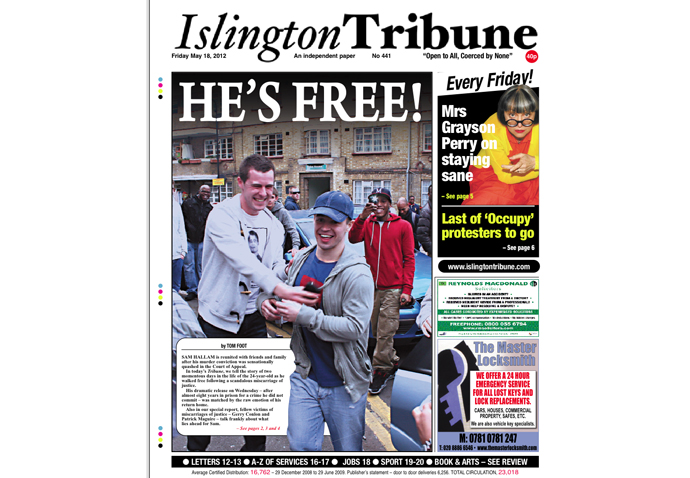Harrington: ‘Brutal test for compensation’
Sam Hallam spent just under eight years in prison after being wrongly convicted of murder
Friday, 14th June 2024

Sam Hallam (centre) at the European Court of Human Rights
THE European Court of Human Rights dealt a heavy blow to victims of miscarriages of justice this week.
A panel of judges on Tuesday in its grand chamber ruled that a legal test for compensation – introduced by the coalition government in 2014 – was not in breach of the European Convention on Human Rights.
The test effectively means that individuals who have convictions quashed on appeal are not automatically considered innocent in the eyes of the law.
This system has led to 93 per cent of miscarriage of justice victims in the past eight years being denied any payouts – saving the government tens of millions of pounds in the process.
Sam Hallam, who spent just under eight years in prison after being wrongly convicted of murder, took a legal challenge to Strasbourg arguing any individual who has a conviction overturned should be presumed innocent.
But after the court’s ruling was handed down, Mr Hallam said: “For 20 years, the whole of my young adult life, I have been fighting a murder case of which I am entirely innocent. Still today I have not received a single penny for the seven-and-a-half years I spent in prison. The brutal test for compensation introduced in 2014 needs to be abolished, it goes completely against what this country should stand for.”
Mr Hallam, from the Arden estate in Hoxton, was sent to prison aged 17 after being found guilty by a jury of the murder of 21-year-old trainee chef Essayas Kassahun. Mr Kassahun was stabbed in Old Street as he tried to break up a fight, and later died from his injuries.
Mr Hallam’s conviction never sat right with the closely knit community around Hoxton, many who had known Sam since he was a child.
There were protests, art exhibitions and the actor Ray Winstone, who was related to a friend of Sam’s, produced a programme about the case on ITV.

The Islington Tribune’s report on Mr Hallam’s release in 2012
There was a play put on at the King’s Head in Upper Street, Islington. Our sister paper, the Islington Tribune, regularly reported on this and visited Sam in prison on his birthday along with his mother, Wendy.
A campaign was led by Paul May and the case was reopened with 14 witnesses saying Sam was not there, including the intended victim of the stabbing, Louis Colley. There was also phone evidence that placed him in a pub with his father on the night of the murder.
But despite Mr Hallam being suddenly released – to roars from the gallery – and his conviction judged to be “unsafe”, he has not received a penny of compensation. There has been a great personal toll on his own life. His father committed suicide when Sam was in prison.
During the parliamentary debate about the coalition government’s new test for compensation, Labour’s Baroness Helena Kennedy, speaking in the other place, told peers that to ask people to prove their innocence beyond reasonable doubt was “an affront to our system of law”.
Mr Hallam and another miscarriage of justice victim, Victor Nealon, had been backed by a Camden Town legal team in fighting to overturn the test – first in the Supreme Court in this country and most recently in the European Court of Human Rights, Strasbourg.
Five judges dissented against the court’s ruling, handed down by the grand chamber on Tuesday that noted there may be a “moral obligation they [UK government] may owe to persons who have been wrongfully convicted”.
Lawyers at the Clerkenwell-based campaign charity Appeal have been involved in the case, arguing “we urgently need to find a mechanism to compensate those victims who have spent years in prison for crimes of which they are innocent, just as we need to compensate all the victims of the Post Office and infected blood scandals”.
Marcia Willis Stewart KC (Hon), Partner of Birnberg Peirce in Inverness Street, Camden Town, said: “Since the quashing of his conviction Sam Hallam has sought redress for years spent in custody, lost years. The passage of time has not diminished the need to right the wrong of those lost years of incarceration. Justice delayed is justice denied.
Today the ECHR decision brings this litigation to an end.
“It cannot be right that in a just society there is no redress for years spent in custody. We will continue to bring pressure to bear on the government to amend the compensation scheme to enable Sam and others to obtain financial redress.”